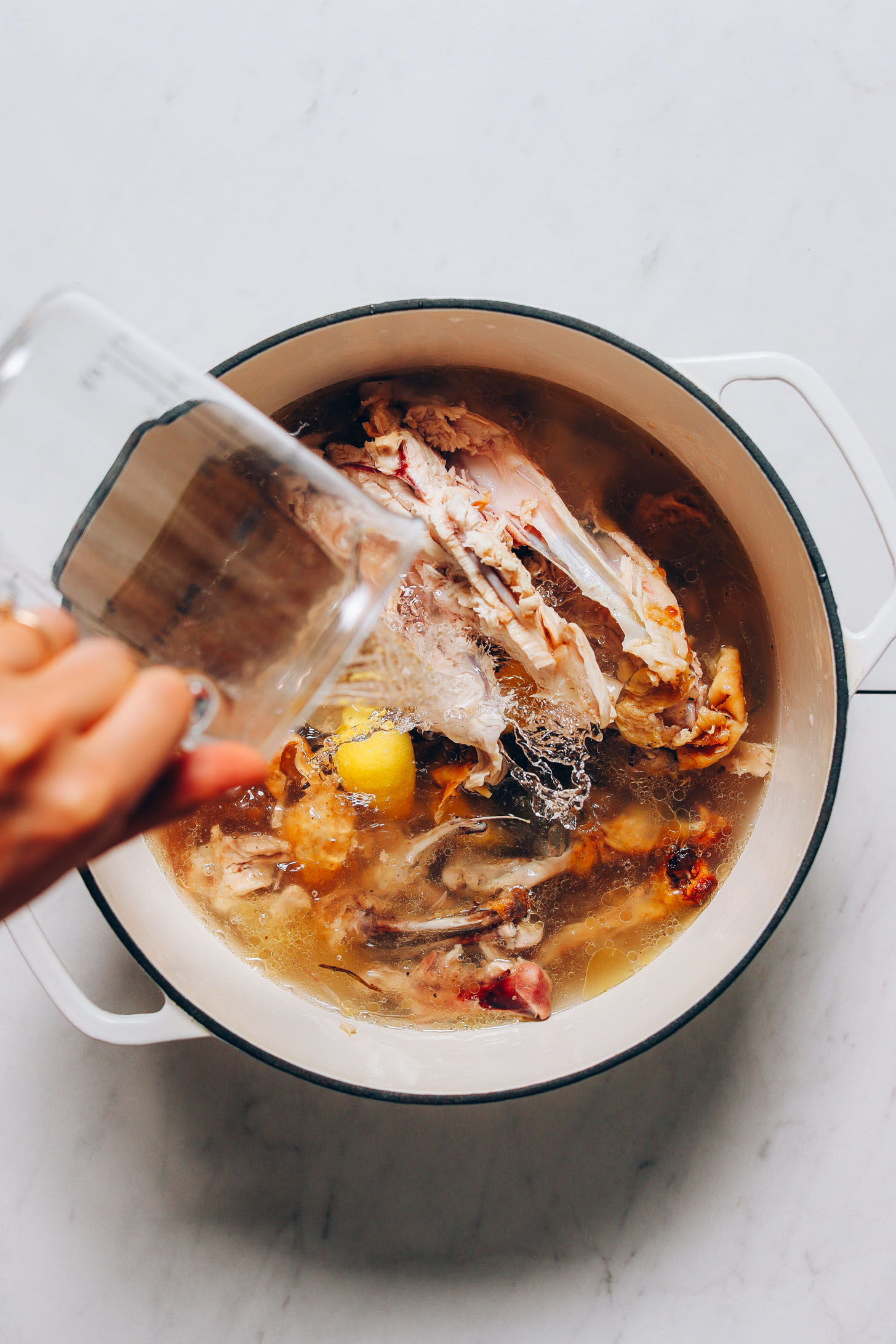5 Simple Meals Using chicken bone broth for Babies
The Value of Healthy And Balanced Food: Why Bone Broth Is a Great Option for Babies
When it pertains to your infant's nourishment, every option matters. Bone broth sticks out as a nutrient-dense choice, using essential minerals and vitamins that sustain development and growth. Its abundant make-up not just help food digestion yet additionally boosts the immune system. Understanding how to integrate this versatile food into your baby's diet can establish the phase for healthy and balanced consuming routines. What are the finest methods to introduce bone broth to your little one?
Nutritional Conveniences of Bone Broth for Newborns
When you introduce bone broth to your infant's diet, you're providing a nutrient-dense food that uses countless wellness advantages. Packed with important vitamins and minerals, bone broth contains calcium, magnesium, and phosphorus, which sustain your infant's growing bones. It's additionally abundant in collagen, helping in the advancement of healthy skin, joints, and connective cells.
Additionally, bone broth is an exceptional resource of amino acids like glycine and proline, which play a considerable role in general growth and muscle growth. These nutrients assist promote a strong immune system, setting a strong structure for your infant's health and wellness.
Additionally, bone broth is easy to absorb, making it a gentle option for your youngster. By integrating this wholesome food into their meals, you're guaranteeing they get essential nutrients essential for their general health. So, go on and make bone broth a staple in your infant's diet plan!
Just How Bone Broth Supports Digestion
Bone broth is packed with crucial nutrients that can actually benefit your infant's food digestion. It advertises gut health and wellness and aids with nutrient absorption, making it a fantastic addition to their diet plan. By incorporating bone broth, you're establishing the stage for a healthier digestive system.
Nutrient-Rich Make-up
One of the most nutrient-rich foods you can introduce to your infant's diet plan is bone broth, which is packed with necessary minerals and amino acids that sustain healthy food digestion. Rich in collagen, bone broth aids reinforce your child's intestine cellular lining, making it easier for their body to take in nutrients. By including bone broth right into your infant's dishes, you're offering them a wholesome food that nurtures their digestion system successfully.
Advertises Gut Health And Wellness
As you present bone broth into your baby's diet regimen, you'll find it not just nurtures however additionally promotes digestive tract health successfully. Rich in gelatin, bone broth assists calm the digestion tract, decreasing swelling and supporting a healthy intestine cellular lining. Furthermore, the amino acids located in bone broth, such as glycine, help in digestion and can aid prevent usual belly difficulties.
Aids Nutrient Absorption
Introducing bone broth not only sustains intestine wellness however likewise plays a significant function in helping nutrient absorption. When you offer your infant bone broth, you're providing a rich source of minerals and amino acids that enhance their digestive processes. The gelatin in bone broth aids to calm the gut lining, boosting its ability to take in vital nutrients. This implies that important nutrients from other foods are more efficiently used by your infant's expanding body. Furthermore, bone broth includes collagen, which sustains the development of healthy and balanced cells and organs. By incorporating this nutrient-dense fluid right into your infant's diet plan, you're ensuring they obtain the maximum advantage from their dishes, promoting total wellness and well-being.
Reinforcing the Immune System With Bone Broth

Furthermore, bone broth contains glycosaminoglycans, like glucosamine, that can enhance the immune system's capability to operate effectively. This implies it not just assists in developing defenses however likewise aids in healing from illnesses. By incorporating bone broth into your infant's diet, you're providing an all-natural resource of nutrients that promotes wellness. So, consider making bone broth a staple in your baby's dishes, as it can play a vital role in their immune health and wellness and advancement.
Easy Ways to Include Bone Broth Into Infant's Diet plan
Including bone broth into your infant's diet plan can be easy and rewarding. You can additionally use bone broth as a base for soups or stews that you prepare for the family members, guaranteeing your baby gets a preference of delicious, healthy and balanced dishes.
If your baby delights in grains, think about cooking rice or quinoa in bone broth instead of water for extra nourishment. These methods will certainly aid your child enjoy the benefits of bone broth easily!
Homemade vs. Store-Bought Bone Broth: What to Pick
Which is much better for your infant: homemade or store-bought bone broth? Self-made bone broth uses you complete control over the ingredients. You can pick top quality bones, natural veggies, and natural herbs, ensuring your baby obtains one of the most nutrients without ingredients or preservatives. And also, making it in the house can be a fulfilling experience, enabling you to bond with your infant while preparing wholesome food.
On the other hand, store-bought options are hassle-free and save you time. They frequently contain preservatives and may not match the depth of flavor and nutrition you get from homemade broth. If you choose store-bought, seek brand names that are organic and without ingredients.
Eventually, if you have the time and resources, homemade bone broth is the premium option for your infant's wellness. If you're brief promptly, pick a high quality store-bought choice as a back-up.
Age-Appropriate Bone Broth Serving Suggestions
As your child grows, it's vital to tailor bone broth offering tips to their developmental phase. For infants around 6 months, start with a few spoonfuls of watered down bone broth. Mix it with water or breast milk to make it less complicated for them to absorb. As they come to be familiar with tastes, you can slowly introduce thicker broth This Site by decreasing the dilution.
When your infant reaches around 8 months, you can serve it cozy in a sippy mug or include it to soft foods like purees. By the time your little one is around a years of age, take into consideration using bone broth as a standalone beverage or mixing it right into soups and stews. Just make certain to maintain the broth low in sodium. Constantly keep track of for any kind of responses, and consult your doctor if you have concerns regarding presenting new foods. Enjoy this healthy addition to your infant's diet!
Other Healthy And Balanced Foods to Couple With Bone Broth for Infants
When you're looking to boost the nutritional value of bone broth for your infant, consider matching it with nutrient-dense vegetables like carrots and spinach. Entire grain options, such as quinoa or wild rice, can also include structure and fiber. Additionally, integrating healthy protein resources like shredded chicken or lentils will certainly complete the meal nicely.

Nutrient-Dense Vegetables
Nutrient-dense veggies are an amazing enhancement to bone broth for infants, enhancing both flavor and nutrition. Integrating veggies like carrots, spinach, and wonderful potatoes can enhance the vitamin and mineral web content of your broth.
You can easily mix these vegetables right into the broth or serve them as soft, cooked items along with it. This not only introduces new flavors yet additionally motivates your child to enjoy a range of nutrients. By matching nutrient-dense veggies with bone broth, you're laying the structure for a healthy and balanced diet right from the beginning.
Whole Grain Options

Healthy And Balanced Healthy Protein Sources
Bone broth pairs incredibly with different healthy protein sources, additionally enhancing your infant's diet regimen. Attempt including soft, prepared lentils; they're nutrient-dense and packed with healthy protein. You can also mix in shredded chicken or turkey, which are very easy for your child to digest. If you're looking for plant-based choices, think about mashed tofu or this hyperlink pureed chickpeas-- both offer superb protein without frustrating tastes. Eggs, when presented securely, are another excellent option; they're versatile and loaded with nutrients. Inevitably, mixing in some well-cooked quinoa can include a nice appearance and added protein. By integrating these healthy protein resources with bone broth, you're offering your infant a balanced, nourishing meal that sustains their development and development.
Frequently Asked Inquiries
Can Bone Broth Cause Allergies in Infants?
Yes, bone broth can create allergic reactions in infants, specifically if they're sensitive to specific active ingredients. Always consult your doctor before presenting new foods and screen for any indicators of allergic reactions after feeding.
How Should Bone Broth Be Saved for Babies?
You need to save bone broth in closed containers, either in the fridge for up to a week or in the freezer for approximately 3 months. bone broth for infants. Constantly thaw it properly before offering to your infant
Is It Safe to Provide Bone Broth to Premature Infants?
It's necessary to consult your doctor prior to introducing bone broth to early babies. They'll assess your child's specific health demands and ensure it's risk-free, considering their one-of-a-kind dietary needs and developmental phase. Constantly focus on experienced advice.
What Are the Indications of Intolerance to Bone Broth in Babies?
When presenting bone broth, look for indicators like fussiness, rash, diarrhea, or throwing up. If your infant shows any of these responses, it's best to news consult a doctor prior to remaining to offer it.
Can Bone Broth Be Made Use Of as a Meal Replacement for Infants?
No, you shouldn't utilize bone broth as a dish substitute for babies. It does not have necessary nutrients required for their growth. Instead, include it right into their diet regimen along with well balanced dishes for included nutrients and flavor.